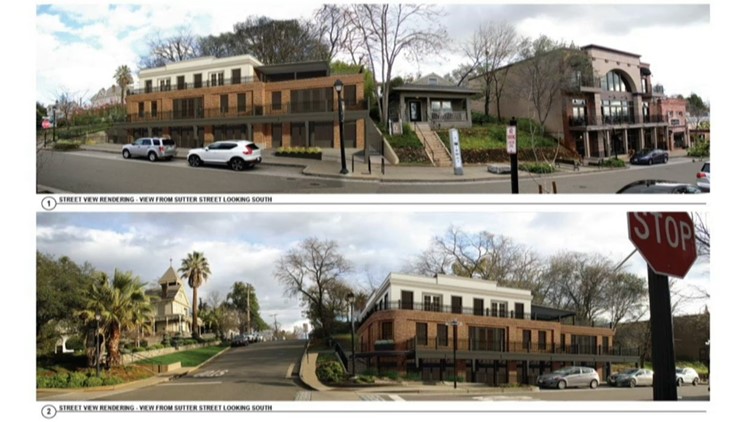FOLSOM, Calif. — Folsom will convene later this month to potentially settle a writ of mandate case brought forth by one city resident.
The meeting will be held Jan. 18 at Folsom City Hall. Of those in attendance will be Bob Delp, 55, who filed the writ of mandate last month in an attempt to halt construction of a three-story, 12,177-square-foot mixed-use building at 603 Sutter Street in the Historic District.
In the suit, Delp said he lives two blocks from the project, which he alleges was inappropriately approved for a California Environmental Quality Act (CEQA) exemption by Folsom’s Historic District Commission (HDC) in September 2023.
Delp says in the filing the HDC imposed 51 conditions on the project to achieve CEQA exemption.
“...The HDC is not the lead agency for CEQA compliance and does not have final decision making authority for the city,” Delp said in the filing.
The city of Folsom declined to comment on the case. Allison Smith, an attorney representing Folsom entities and the project developer, Ziad Alaywan, also declined to comment.
Delp said he is generally supportive of the property development, but he thinks the project is too large.
“I am not opposed to context-sensitive development of the 603 Sutter Street property,” Delp said. “The current project does not achieve that. My concerns about the project design include the building's size, effects on adjacent historic properties and destruction of oak trees.”
Delp alleges the project would destroy 11 oak trees, suitable nesting sites for Swainson’s hawks, a threatened species native to the western United States and Canada.
An arborist will oversee any tree removal, and if active nests are identified between March through September’s nesting season, “construction should be delayed until the young have fledged,” according to HDC final approval documents containing the conditions Delp said were imposed for CEQA exemption.
CEQA exemption concerns
Delp said the city identified the project’s effects on the community in 2021 and Folsom offered 13 mitigation measures “to ensure impacts would not be significant.”
With the CEQA exemption, Delp alleges Folsom and developers do not have to incorporate mitigation measures into the project's construction.
These measures included avoidance of tree removal, geotechnical reports and requirements for construction worker cultural sensitivity training because the project could destroy human remains or cultural, historical and archaeological resources, the suit says.
If human remains are discovered, all work in the project’s vicinity will stop and not continue until the Sacramento County Coroner’s Office determines whether the remains are those of a Native American, HDC documents said.
“In the event of discovery of human skeletal remains, however fragmentary or disturbed from their original context, the (coroner’s office) and the Native American Heritage Commission are to be notified of the discovery immediately,” city documents said.
Doug Elmets is a spokesman for the United Auburn Indian Community (UAIC). He said the city consulted the UAIC in 2021 to adopt contractor awareness training in preparation of unanticipated discoveries.
Folsom is required to notify Native groups of the project in accordance with state law.
Elmets told ABC10 the UAIC is unaware of any known tribal burial or cultural resources present in the project area.
“The tribe does not have an official position on the project, but we do have concerns about the process through which the project secured city approval,” Elmets said.
Elmets said the CEQA includes very important protections for tribal cultural resources, and the tribe appreciates when developers and local jurisdictions take those protections seriously.
“Exemptions to the CEQA process can prevent those protections from being implemented as intended,” Elmets said.
Delp said the settlement meeting in two weeks is required by state law.
"I will consider any suggestions at efficient resolution the city might propose," Delp said.





















